|
|
|
| I film perduti
di Louise Brooks The American Venus, A social celebrity, Just another blonde
|
|
|
AMERICAN FILM CATALOG. Mary Gray, whose father manifactures cold cream, is engaged to sappy Horace Niles, the son of Hugo Niles, the elder Gray's most competitive rival in the cosmetics business. Chip Armstrong, a hot-shot public relations man, quits the employ of Hugo Niles and goes to work for Gray, persuading Mary to enter the Miss America contest at Atlantic City, with the intention of using her to endorse her father's cold cream should she win. Mary breaks her engagement with Horace. When it appears that she will the contest, Hugo lures her home on the pretext that her father is ill, and she misses the contest: Chip and Mary return to Atlantic City, discovering that the new Miss America has told the world that she owesa all her success to Gray's cold cream. On this note, Chip and Mary decide to get married" |
|
VARIETY.
This is
the long-heralded exploitation special of Famous Players – the picture to
afford a million tieups for publicity and other purposes. Its chief tieup so
far has been with the alleged expose of the New York Graphic of the last
beaut contest in Atlantic City, in which, the Graphic charged, Fay Lanphier
selection was prearranged. NEW YORK TIMES.
The
enormity of the tragedy that burst into the life of Miss Alabama, one of the
characters in a picture entitled The American Venus, can be appreciated by
every woman who is not color blind, for this stunning girl, a contestant in
a beauty show, receives from her home town white dress instead of one of
the shade suited to her eyes and hair. It looked like life’s darkest moment
to Miss Alabama, when out of the blue there came an angelic blonde, with
cherry lips andturquoise eyes, who offered the despondent maiden a gown of
metallic cloth that was just the very thing Miss Alabama needed. The girl
who brushed away the tears on the Southern girl’s cheeks was Mary Gray, who
also aspired to win the coronet of Miss America. She hailed from
Centreville, N. J., where her father in off moments from petty gambling
indulged in the business of making complexion creams.
CHICAGO TRIBUNE. The
heroine is Mary Gray, whose lovable but irresponsible father is in the
beauty cream business in Centerville. Mary is engaged to Horace Niles, sappy
son of the manufacturer of a rival beauty cream. Mr. Gray owes Mr. Niles
money, which is why Mary feels it her duty to stay engaged |
|
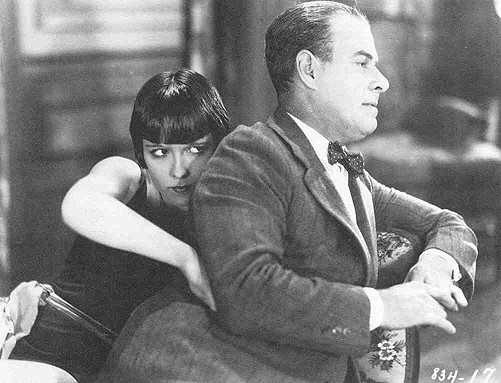 |
|
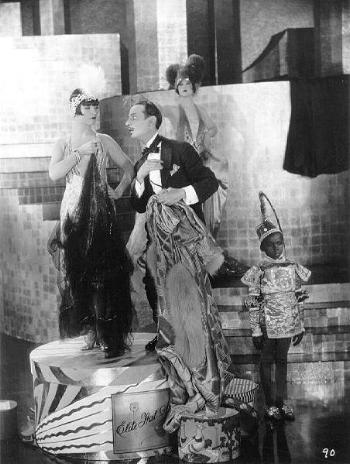 |
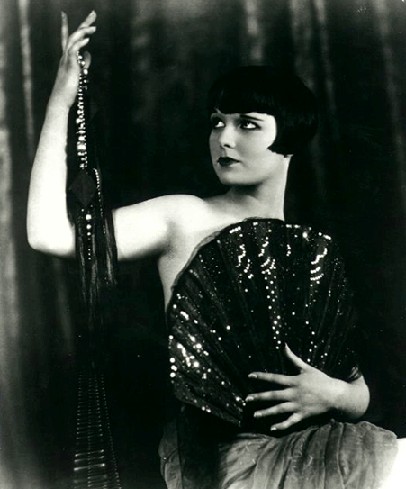 |
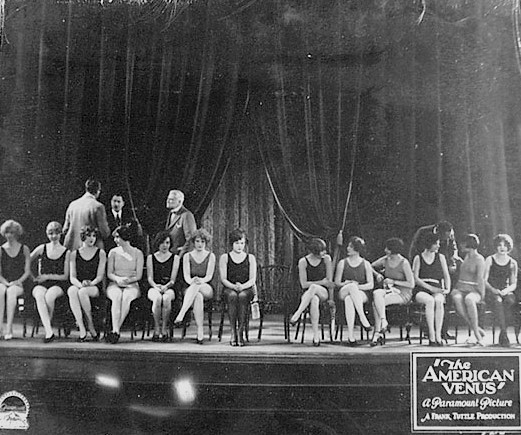 |
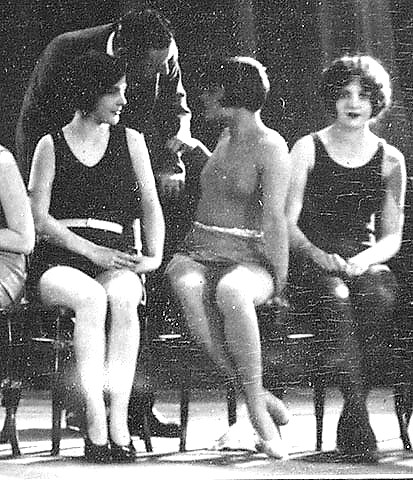 |
|
|
|
|
|
Max Haber, a smalltown barber, is the pride of his father, Johann, who owns an antiquated barbershop. Max adores Kitty Laverne, the manicurist, who loves him but aspires to be a dancer and leaves for New York, hoping that he will follow in pursuit of better things. Mrs. Jackson-Greer, a New York Society matron, has occasion to note Max fashioning the hair of a town girl and induces him to come to New York and pose as a French count. There he meets April, Mrs.' King's niece, and loses his heart to her, as well as to Kitty, now a showgirl. At the theater where Kitty is appearing Max is the best dressed man in April's party, but later at a nightclub Kitty exposes him, and he is deserted by his society friends. Disillusioned, Max returns home at the request of his father. Kitty follows, realizing that he needs her |
|
|
VARIETY. As to the
tale the film unwinds it matters not much what it is. Menjou is cast as the
best barber in Huntington, L. I. He and his old dad are the only barbers
there, from the picture. Pop Haber (mr. Conklin) after opening up in the
morning shaves himself with a safety razor, which goes for a wow laugh in
the shop. Kitty Laverne (Miss Brooks) acts as cashier. She and the barber’s
son are in love. She, however, decries the boy’s lack of ambition and to
stir this leaves Huntington and the barber shop flat in New York.It takes
but a week for the boy to follow her. He can’t locate her. She is working in
a night club while he is clipping in a Broadwy barbershop.
NEW YORK TIMES. Mr. Menjou’s part is that of Max Haben,
the son of John Haben. Mr. Conklin officiates in the role fo the father,
who, when nobody is looking, deceitfully uses a safety razor to shave
himself. Max’s ability as a barber is not confined to male chins and
haircuts, for he also is known as the best ‘bobber’ in town. Before the
young man leaves for Gotham, the shop shelves are filled with shaving mugs,
but soon after his departure these steady customers dwindle grasually until
the old barber gazes mournfully at a solitary mug, and that is his own.
(...) Soon after the prleiminary scene, A Mrs. Jackson-Greer is introduced.
She is so struck by the way Max trims her hair that she suggests that he
ought to go to New York and open a ‘beauty shop’. She even volunteers to
help him. Now Max is very much in love with Kitty Laverne, who had left his
father’s employ to go to New York. Therefore he decides to throw in his lot
with others in a big cit; but soon after his arrival he is forced to take
employment in a busy barber shop. He is sent one day to shave one of the
guests in a room of a hotel, and this customer is surprised to see much a
handsome barber, and he comment upon Max’s appearance while the barber is
preparing his razor.
CHICAGO TRIBUNE.
The hero of this piece is a barber and a son of
a barber. |
||
|
AMERICAN FILM CATALOG. Jimmy O'Connor, employed in a gambling establishment, is so honest that he is offered a banking job at any time; and for his sake, Scotty, his protegé and pal, decides to go straight. The boys go fifty-fifty in everything until Scotty falls in love with Diana, who operates a shooting booth at Coney Island. Jimmy declares that he disapproves of all women - except his mother - and Scotty despairs until he schemes to have Jimmy meet Jeanne, Diana's girl friend. It is only when they expect to be killed in an airplane crash that Jimmy tells Jeanne he loves her, but later he feigns indifference: Jeanne is heartbroken; Scotty explains that he can't marry Diana until Jimmy is safely engaged; and with that both boys are reconciled to their respective sweethearts
VARIETY. For the greater part of the action the
audience is deliberately misled to suppose that it is the blonde who is the
sweetheart of the hero, only to have the tables turned at the end, when it
is revealed that the woman-hating boy has been ed to the altar in a
sentimental conspiracy of his pal and the pal’s girl (...) |
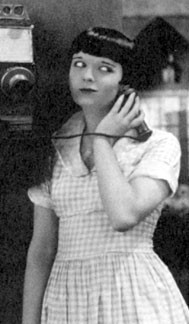 |
|
NEW YORK TIMES.
A wise
old negro told the hero’s mother that her son was in the sporting goods
business, working from 7 to 11. Actually, James O’Connor at that moment
derived his livelihood from shaking dice in Coney Island. Like most of these
young men who are caught in the opening chapter sowing their wild oates
James takes stock of the error of his ways and forthwith banks a –ere matter
of $ 4,000 and accepts a decent position. Hence for the balance of this tale
Mr. O’Connor was making himself as sympathetic as possible. He goes up in a
airplane with jeanne Cavanaugh (Miss Mackaill) and does not appear to be in
the least, nervous, not even when it becomes known that the under-carriage
of the machine has been detached through a brush with the telegraph wires. CHICAGO TRIBUNE. Jimmy O'Connell, played by Jack Mulhall, makes a fairly good living by shooting the ivories. He's a nice boy, though, and is "So honest he almost makes gambling legal". He's also good too his mother and regards his pal, Kid Scotty, as Damon regarded Pythisa. Scotty is equally fond of Jimmy, so of course, when they appear to fall in love with the same girl, each one nobly renounces her in favor of the other. Enter another girl who gives that twist to the story to which I referred above. |
|
|
|